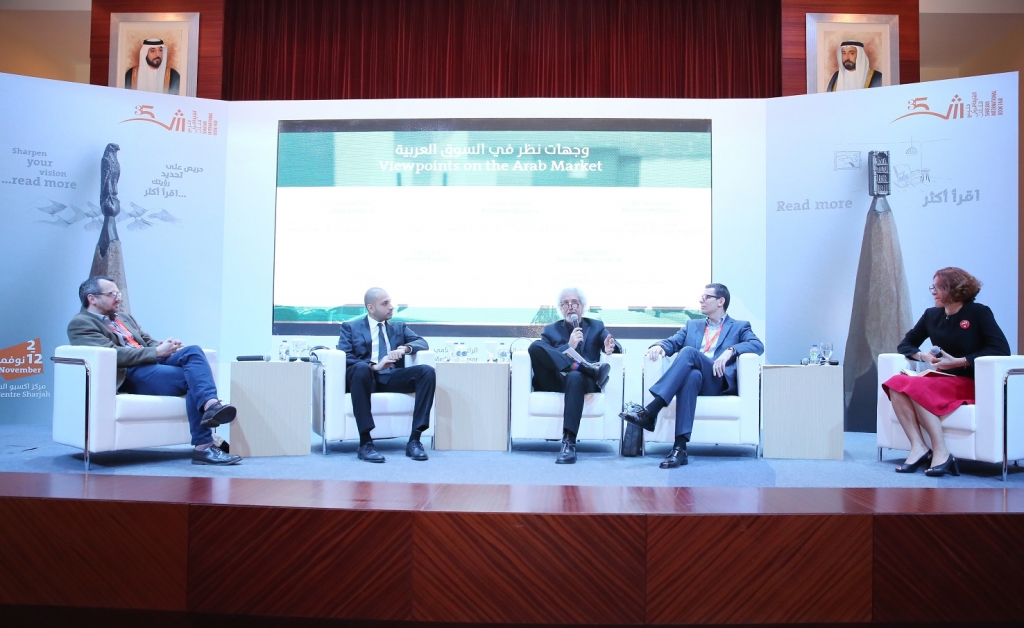
Experts Assessment on the Present and Future of Arab Publishing Provided to Conclude SIBF’s Professional Programme
The discussions on the second day of the 6th edition of Sharjah International Book Fair’s (SIBF) Professional Programme was dedicated entirely to understanding the Arab publishing market – recounting the challenges it faces today, notable advancements it has made in recent decades, and new strategies that can be implemented to further consolidate the industry within the MENA region.
Attended by more than 200 international publishing professionals, the day opened with an expert panel discussion titled, ‘Viewpoints on the Arab Market’. Panelists Matt Cowdery, Head of Sales, Hachette MEA; Kempton Mooney, Senior Director, Research & Analytics, Nielsen Book; Ahmed Rashad, Executive Director, Al Masriah Al Lubnaniah for Publishing; Nermin Mollaoglu, Literary Agent, Kalem; and (Chair) Michel Moushabeck, Publisher/Editor, Interlink Publishing, threw light on the commonalities and variations in publishing trends, consumer behaviour, the presence of international publishers, e-commerce, and market situation dynamics in the 22 countries of the Arab world.
Providing an overview of Hachette, its various imprints and Hachette International – the entity which sells their titles globally, including the UAE, Cowdery said: “MENA has always provided us easy access and an open market for selling our trade titles here. While there are subtleties of readership trends in the different regions here, which are not the easiest to detect, our sales figures have gone up to double digits in a short span of five years. With UAE, Saudi Arabia and Lebanon capturing the largest market share, the genres of international non-fiction, celebrity titles, autobiographies, and a fast-emerging market for graphic novels, have done exceedingly well here.”
Taking up a discussion on retail from a consumer’s perspective, Mooney remarked, “Better job prospects and increased consumer confidence in personal finance are key to increasing ‘consumer confidence’ in local retail markets. Book retailers must enhance consumers’ in-store experience, and sales & marketing strategies must keep in mind and cater to the uniqueness of each country in the Arab region. Online shopping motivations should also be regularly tracked, as a trend for ‘finding the best deal online’ is seen in 34 per cent of the UAE’s consumers making purchases through e-commerce today.”
Providing a detailed overview of Arab publishing, Rashad said: “The Arab publishing landscape has seen tremendous growth over the past decades. With the age group between 18 and 35 years dominating our demographics, the appearance of new generation young publishers continually introducing global publishing standards and practices to our markets, numerous retailers like Kinokuniya in Dubai and the Virgin Megastore featuring a rich collection of regional and international titles, reading initiatives, new translation projects, and the establishment of prestigious recognitions and awards have brought about tremendous positive change in the publishing market situation in this region.”
“In order to make Arabic literature better known to the world, we need to have a more focused and workable plan for Arabic translation projects to facilitate the translation of more titles into foreign languages. Also, we need to strengthen our infrastructure for digital publishing, to capitalise on the growing demand for eBooks, which has spiked due to the penetration of internet usage on smart devices,” he added.
Sharing her decade-long tryst with Arabic publishing, Mollaoglu stressed on the need for literary agents to be culturally and politically sensitive while approaching new business opportunities.
“As literary agents, we must practice the healing art instead of simply the dealing art. It is our duty to educate ourselves to know the societal and political conditions that influence publishing in every country we try to approach expecting to close a few book deals with them. Doing so puts us in better light and helps building trust from the get go,” she added.
To wrap a rather informative session, Moushabeck congratulated all publishers for their great contributions to society through books. All participants identified the need to further the role of literature to promote diversity, inclusion and tolerance, and collectively vowed to keep working relentlessly towards using books, literature and publishing as vehicles of positive social change in a world that is disrupted by unrest, illiteracy and inequality.
The matchmaking sessions followed, in which publishers picked up interactions and negotiations from where they left the previous day.


























